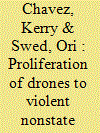|
|
|
Sort Order |
|
|
|
Items / Page
|
|
|
|
|
|
|
| Srl | Item |
| 1 |
ID:
172338


|
|
|
|
|
| Summary/Abstract |
Given the conventional claim that external threats increase internal cohesion and government capacity, cross-country studies have examined how interstate conflict events influence domestic politics. This article reevaluates the in-group and out-group mechanisms by examining how international strategic rivalry, which indicates the presence of persistent external threats even in the absence of military conflict, affects domestic political competition. An alternative explanation suggests that the effect of external threats on political incentives of domestic actors differs between regime supporters and oppositions. We posit that the presence of international threats from rival states inflames domestic unrest and oppositions’ antiregime challenges, while making governments rely more on repressive tactics given resource constraints and a high level of domestic political intolerance. In addition, we propose that the domestic consequences of international rivalry are heterogeneous depending on the characteristics of political systems and the level of threat perception. Empirical tests reveal robust evidence for the hypotheses.
|
|
|
|
|
|
|
|
|
|
|
|
|
|
|
|
| 2 |
ID:
177560


|
|
|
|
|
| Summary/Abstract |
Scholarship on the proliferation of unmanned aerial vehicles (or drones) mainly focuses on states’ use, sidestepping the consequential proliferation of drone technology to violent nonstate actors (VNSAs). Meanwhile, an increasing corpus of media, military, and policy publications underscores the latter’s importance. The source of the gap is that existing proliferation models overlook civilian drone technologies. Applying supply- and demand-side proliferation models, we confirm conventional wisdom that military-grade drones are not likely to proliferate to VNSAs. Including civilian drones inverts proliferation logic across the boards. Shifting from cost-prohibitive, inaccessible, and technically complex military technologies to cheap, simple civilian platforms, we demonstrate that VNSAs have the resources, capacity, and interest to effectively incorporate drone programs to advance their aims. Furthermore, in context of state and nonstate actors’ security environments and normative constraints, the proliferation of civilian drones matters for international security. Norm-abiding states need expensive, high-performance, norm-enabling drones. For norm-defying VNSAs, civilian platforms are sufficient, even efficient, to advance their agendas.
|
|
|
|
|
|
|
|
|
|
|
|
|
|
|
|
|
|
|
|
|